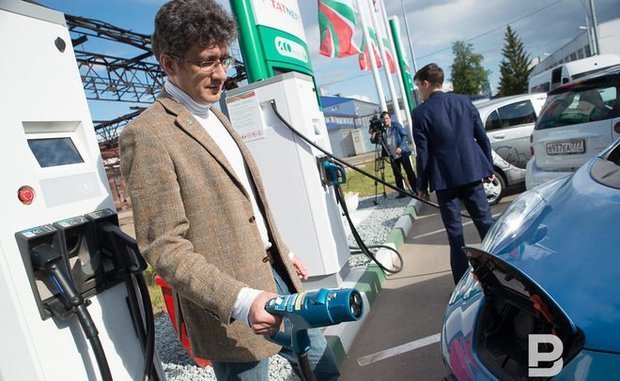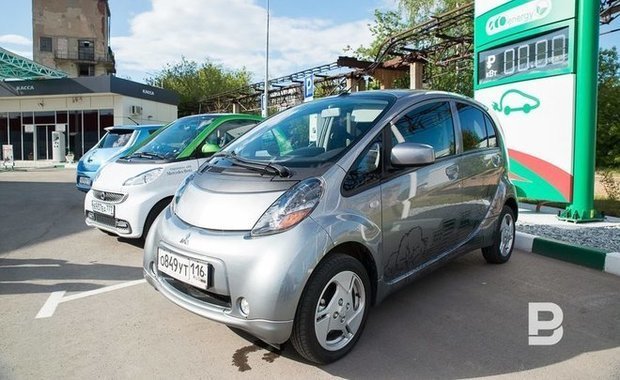Who owns electric charging station market in Tatarstan
Grid Company, UD Group or Innopolis resident?
A new technological market is being formed in Tatarstan — charging stations for electric vehicles. Investors' interest in it increased after the republic adopted a programme for the development of charging infrastructure. It is also stimulated by federal subsidies that are allocated for the installation of domestic charging stations. Who in the republic relies on “green technologies” — read in the review of Realnoe Vremya's analytical service.
By 2024, a network of at least 183 electric charging stations (EVSEs) are to appear in Tatarstan, follows from the programme for the development of charging infrastructure for 2022-2024. Ninety-five new EVSEs will be introduced this year thanks to federal funding: the republic became one of eight pilot regions that received a subsidy from the Ministry of Economic Development of Russia for the development of charging station infrastructure. The Government of Russia compensates the regional operator of EVSEs for 60% of investments in the installation of a domestic station and 30% for the technical connection.
According to the 2charges crowdsourcing platform, which unites owners of electric cars in Russia, 88 EVSEs are already operating in Tatarstan today, and the number of electric cars, according to experts, is already approaching a thousand.

Tatarstan lags behind Moscow and St. Petersburg
There are 4,364 stations in Russia, including 3,679 slow and 688 fast ones. The average charging session time on slow connectors is 1,36 hours, and on fast ones — 54,3 minutes.
The most developed electric charging infrastructure is deployed in Moscow and Moscow Oblast. In terms of the number of slow charging stations among the regions, according to 2charges, the leaders are Moscow Oblast, Moscow, and Krasnodar Krai.
Fast charging is most common in Moscow, Krasnodar Krai, and Primorsky Krai.
Zelenodolsk district is the cradle of charging manufacturers
Two companies under the Non-stop Power (NSP) and E-PROM brands are engaged in the production of charging stations for electric vehicles in Tatarstan.
NSP produces charging stations on the basis of Zelenodolsk Electrotechnical Plant PLC (ZETZ), the main owner of which is UK Energorazvitie PLC, controlled by Ilshat Fardiev. The price of a slow charging station in NSP starts from 60 thousand rubles. The price of a fast one varies from 1,3 to 3,3 million rubles. ZETZ has already installed more than 35 fast charging stations with a capacity of 60 to 180 kW in Tatarstan and more than 20 fast stations with a capacity of 60 to 100 kW throughout Russia, said Nail Galimov, the director of ZETZ. The revenue of ZETZ in 2021, according to SPARK-Interfax, amounted to 894,9 million rubles, net profit — 26,05 million rubles.
The second manufacturer, Promenergo PLC, owned by Fannur Nidiyatov, makes E-PROM charging stations at the Zelenodolsk PSEDA. The production capacity is 180 pieces of fast charging stations a year and 1200 slow charging stations a year. To date, Promenergo has produced more than 50 EVSEs, according to the general director of the company, Sergey Afonin. According to SPARK-Interfax, the company's revenue amounted to 1,06 billion rubles in 2021, net profit — 143,9 million rubles.
In addition to Tatarstan manufacturers, stations with a high degree of localisation in Russia are produced by five more manufacturers: Parus Electro PLC (Moscow), GRPZ JSC, Fora brand (Ryazan, Radioelectronic Technologies concern (KRET) of Rostec State Corporation), Jupiter PLC, Yablochkov brand (St. Petersburg), ZNGA Anod PLC (Perm, a subsidiary of the PSS plant) and NPP Energia (Moscow).

Competition in the market is gaining momentum
Electrifly, a resident of Innopolis special economic zone, was one of the first companies to enter the Tatarstan market in 2017. The company does not have its own charging stations, it works as a provider, providing charging owners with software to monetise their infrastructure. The management of Electrifly PLC has about 300 stations throughout Russia today, of which about 20 are in Kazan.
The largest player in this market is the Grid Company. By the end of the year, it will deploy a network of 95 electric charging stations throughout Tatarstan as part of the federal programme for the development of charging infrastructure. The first two stations have already appeared in Nizhnekamsk and one each in Nurlat and Chistopol. Forty-six EVSEs are to appear in Kazan, 10 — in Almetyevsk and Nizhnekamsk, 16 — in Naberezhnye Chelny, and 10 — along federal and regional highways each. Investments in the project are estimated at 300 million rubles. The cost of charging an electric car at new stations can be up to 15 rubles per kWh.
Developer UD Group is also showing interest in the market, which is developing its own network of Greengy electric charging stations. Today, the network has four EVSEs — in the parking lot of Kazan Mall shopping centre, Gorki Park shopping centre, in Tsarevo-Village residential complex, and in UDACHA Retail Park parking lot. Greengy EVSEs work on the basis of software developed by Touch company from St. Petersburg. UD Group plans to place EVSEs in 40 locations in Tatarstan, primarily in public parking lots of the city, including shopping and business centres, and in the next 10 years to place at least 300 EVSEs throughout Russia.
Tatneft also has its own fast EVSEs (about 15). But for an oil company, this is more of an image direction: charging an electric car at Tatneft is absolutely free. Seven more stations in Kazan were installed by the federal operator Punkt-E, which is present today in 11 regions of Russia and manages a network of 86 EVSEs.
Also in Kazan, there are stations of Touch charging station operators from St. Petersburg (manages a large network of 350 EVSEs in the Russian Federation) and Portal Energy (57 EVSEs in the country). Charging an electric car today is possible through the mobile applications of Tatarstan manufacturers of chargers — NSP and E-PROM.
“This is a new complex market, with new technologies and business processes”
-
-
Ilshat Fardiyev Director General of the Grid Company
-
Last year, as part of the planned renewal of the fleet, the Grid Company purchased 13 electric vehicles of the Chinese brand JAC for its own needs and built an EVSE in each of its branches. We have seen from our own experience that it is more profitable to use electric transport than gasoline. A full charge of an electric car is enough for 180 km of mileage in winter, and in summer the distance can grow up to 250 km. Electric cars are the future. The experience of EVSE operation in our own branches has proved to us that this can be a good business.
All new EVSEs of our network will be exclusively Russian-made. The stations will fully comply with the technical requirements approved by Order No. 1776 of the Ministry of Industry and Trade of the Russian Federation dated April 29, 2022. For example, they will be equipped with three types of connectors at once — not only the most common Japanese CHAdeMO and CCS2 in the country (for European models), but also the “Chinese” GB/T, which in the near future may become the main one in Russia for new electric vehicles.
We plan to start commercial operation of our network from January 1, 2023.
-
-
-

Nail Galimov Director of Zelenodolsk Electrotechnical Plant PLC
-
The Zelenodolsk Electrotechnical Plant opened in 2019 and began the production of low and medium voltage electrical equipment using Smart technologies for energy facilities.
At the beginning of 2020, it was decided to start production of fast charging stations for electric vehicles. We came to this decision after a lot of analytical work. We studied the market and realised that at that time this niche was free in Russia. Yes, charging stations were installed in the country, but there were very few of them and they were of foreign production, and there were even fewer fast charging stations.
Having studied the experience of foreign manufacturers, we launched the production of charging stations at the plant's own facilities. Within two years, our team has doubled in size. A new direction has been opened — the NSP service management department, which is engaged in technical support for users, monitoring, maintenance and commissioning of charging stations.
For two years we have worked on the localisation of charging stations main components production. Today, our charging stations consist of 80% of components from a domestic manufacturer.
In addition to the equipment itself, an important component of the product is software — this is the integration of charging stations into one single network. It allows monitoring of all charging stations, has a WEB interface and a mobile application. NSP today is a ready-made product with its own software.
Today we have installed more than 35 units of fast charging stations with a capacity of 60 to 180 kW in Tatarstan, and more than 20 units of fast charging stations with a capacity of 60 to 100 kW throughout Russia.
The withdrawal of foreign companies has freed up a place in the market for a domestic manufacturer. This is confirmed by the growth of Russian manufacturers, which we are seeing in 2022.
-
-
-

Sergey Afonin Director of Promenergo PLC
-
In 2020, after analysing the needs of the market, we developed and manufactured the first experimental charging station with one fast and one slow charging port. To date, we have already produced more than 50 electric charging stations.
We plan to participate in the federal programme for the development of charging infrastructure and count on the help of the state. Certainly, this programme is a great support for any manufacturer, because the engine for the development of advanced technologies around the world are large federal and regional projects.
Sanctions, of course, have affected this market. The situation is what is called “like everyone else's”, with its own difficulties and opportunities. We are focused on maintaining technological sovereignty and are actively working towards import substitution. There are plans to increase the localisation of production in terms of individual components of products and the development of the R&D direction.
-
-
-

Yefim Klimov Director General of Etton Group of Companies
-
Charging stations remain one of the problems for electric car owners today. When leaving Kazan, you have to carefully plan your trip around the country. In this regard, all possible IT services, data analysis tools are a serious assistant on the road.
We have developed he mobile application for the Tatarstan manufacturer of Promenergo chargers — E-PROM. Today, it is available for download in the AppStore, Google Play Market and is distributed for free. We have ideas on how to modernise and develop the application, use artificial intelligence algorithms so that the owner of an electric car gets maximum services on one screen.
The sanctions have not greatly affected the electric car market, it continues to develop at a moderate pace. In the foreseeable future, Chinese players are expected to appear with budget cars and, as a result, lower prices.Most electric vehicles in Tatarstan are represented by the budget Nissan Leaf, and premium class models — Tesla, Porshe Taycan — are single examples. Economy class models are inexpensive, allow owners to save on gasoline and consumables (oil, candles, filters). Moreover, today electric cars are especially beneficial for residents of the suburbs, that is, those who live near Kazan, but pay a tariff at reduced rural standards.
-
-
-

Lenar Kashapov Director General of Electrifly PLC
-
Everyone is trying to work in this market without really understanding. A special boom happened when the state began to subsidise the installation of domestic charging stations.
The picture looks beautiful: now I will have my own Lukoil or my own Tatneft here. In fact, everything is different here. It doesn't work like with gasoline. If the most important thing in gasoline is the quality of gasoline, it is necessary to ensure the interaction of electric vehicle software with station software. As a rule, there are conflicts here, and therefore 80% of the charging stations installed under the state programme work unsteadily.
An electric car without software is a brick, you can't do anything with it. And it is the same with charging station. It may or may not charge. If it breaks, you can't run it without software. And it breaks down quite often.
Electric cars come from different continents — from China, Japan, America, Europe. Electricity is different everywhere. Each manufacturer has different batteries and different systems. Therefore, when the American Tesla comes to charge, it may have problems with the domestic charging station.
We usually contact the manufacturer of the charging station, send the logs that the machine showed when charging, they fix it in their software, remotely send a new firmware to the station, and then the station can already charge.
This is a new complex market, with new technologies, business processes and business models. Today Tatarstan is the leading region. There are regions in which there is not a single charging station, while we already have two manufacturers working.
Of course, station owners also have problems with payback. If earlier they counted on an increase in the fleet of electric vehicles, because six brands promised to enter the Russian market this year, then after February 24, all plans collapsed. It is unclear how to pay for the already installed charges now.
-
-
-

Roman Tyukalov Greengy CEO
-
Greengy electric charging station network was created by UD Group to solve the problem of underdevelopment of the electric vehicle infrastructure. At the moment, refueling electric vehicles can become a real headache for its owners. We are aimed at uniform coverage of the charging stations of the road networks of Russian cities.
The active use of the first electric charges not only showed us the demand for this product, but also pushed us to the decision to combine the already existing EVSEs into a single network under the Greengy brand.
Our project provides two directions. The first covers the need of electric car owners for emergency charging of their vehicles. An EVSE, located in a convenient location, will allow you not to be left without a means of transportation if the driver fails to calculate the required charge reserve. Everything is simple here: the user connects and pays for a charging session of 15 rubles for 1 kW of consumed electrical energy through a modern mobile application.
The second direction is created to regularly provide owners of electric vehicles with the necessary resources — near the house and the parking place of the car. Greengy will provide an opportunity to take a charging station for individual use by “subscription”. It is suitable for living in both apartment and private houses. I will immediately make a reservation that this method is implemented only if there is a technical possibility: the permitted capacity, the permission of the management company.
If the key goal of the Grid Company is to “close” all highways so that the distance between gas stations does not exceed 140 km, then our priority is to cover urban locations. The Grid Company has a plan for the development of infrastructure between cities, and as they move forward, we can adjust our roadmap if necessary.
-
-
-

Rustem Galimzyanov representative of Restart non-profit organisation for development of electric vehicles infrastructure
-
According to official data of the Traffic Police of the Republic of Tatarstan, 80 electric vehicles were registered in Tatarstan at the beginning of January 2021. As of January 2022, it is already 304. The growth for the year is almost 4 times. According to our estimates, if the number of cars grows 4 times this year, Tatarstan will approach the fleet of thousands of electric cars. This year, a lot began to be brought through Kazakhstan from China. Previously, all deliveries were mainly from the American and European markets through Belarus.
Tatarstan today is one of eight pilot regions that have received subsidies from the Ministry of Economic Development of the Russian Federation for the installation of Russian charging stations. Initially, we had a quota of about 220 charges, but then it was cut to 95 for us. Four charging stations out of 95 are already operating in Chistopol, Nurlat, Nizhnekamsk. Another 91 will be delivered before the end of the year.
In early October, a decree of the Cabinet of Ministers of Tatarstan was issued that developers were recommended to allocate at least 5 percent of parking spaces for electric vehicles when designing residential complexes. As an NGO, we are currently working with various developers who are building residential complexes, advising on which equipment is best to choose and where to place the station.
Our NGO is actively engaged in popularisation of this direction, together with our partners, a laboratory has been organised at the department at the Kazan State Energy University with practical exhibits for personnel training. On September 9, the World Day of Electric Transport, in Uram extreme park, we held the festival “Electric Mobility”.
People today need to be told about the advantages of this type of transport: parking is free, the cost of moving is 10 times cheaper compared to the internal combustion engine. And cars are not more expensive, this is also a myth. A decent “people's” Nissan Leaf can cost 900 thousand rubles. Tesla Model 3 — 3 million. A wide range of models represents the Chinese automotive industry, for every taste and budget. Every manufacturer in the line now necessarily has a model with an electric motor. Volvo has generally stated that they will stop producing cars for internal combustion engines from 2025.
-
-
-

Iya Gordeeva Chairman of the Electric Vehicle, Unmanned and Connected Transport and Infrastructure Development Association (AETI)
-
The sanctions have certainly affected the market of electric charging stations. Basically all European suppliers of charging equipment have left it — these are ABB, Schneider, Kostad, and some other European brands. But due to the rather extensive market and the implementation of the federal programme for the creation of charging infrastructure, we have a fairly large number of Russian-made players — these are Parus Electro, Permsnabsbyt, NSP, and Promenergo, which already have not just assembly plants, but production from Russian components with certificates from the Ministry of Industry and Trade that these stations meet all the requirements for the “Russianness” of this equipment.
To date, several strong players are forming in the Russian EVSE market — these are the network organisations Rosseti, Roshydro and Network Company, and private companies Green Drive, Punkt-E, EV-Time, which install infrastructure at their own expense. There are also companies that integrate this infrastructure. I am absolutely sure that in the next two or three years there will definitely be no question of any monopoly. In the future, as a rule, there will be a consolidation of players in the market. It was the same with telecom operators. I think there will be four or five major players in the Russian market in the future.
-